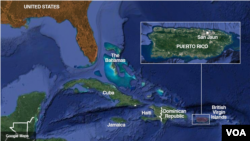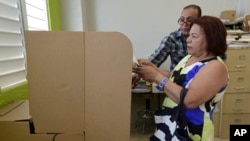Residents of the U.S. territory of Puerto Rico voted Sunday to become the 51st U.S. state in a non-binding referendum.
Nearly half a million votes were cast for statehood, about 7,600 for free association/independence and nearly 6,700 for the current territorial status. Turnout was 23 percent.
"In any democracy, the expressed will of the majority that participates in the electoral processes always prevails,'' the territory's Governor Pedro Rossello said. "It would be highly contradictory for Washington to demand democracy in other parts of the world, and not respond to the legitimate right to self-determination that was exercised today in the American territory of Puerto Rico.''
This is the fifth time the non-binding referendum has been put before the island's voters. In 2012, the island opted for statehood, but Congress, the ultimate arbiter of Puerto Rico's bid for statehood, never picked up the matter.
Peter Hakim, a senior scholar and president-emeritus of the Washington-based Inter-American Dialogue said the latest referendum was "pretty much a meaningless vote."
"The fact that only 23 percent of the population came out and voted, and almost all of them were pro-statehood, is not surprising," Hakim told VOA. "And the fact is, it probably has almost no impact on what will happen to Puerto Rico in the coming period."
The referendum coincided with the 100th anniversary of the United States granting U.S. citizenship to Puerto Ricans, though they are barred from voting in presidential elections and have only one congressional representative with limited voting powers.
Schatz argues that statehood would help Puerto Rico in its attempt to face down its debt crisis. But rival parties on the island - the Popular Democratic Party and the Puerto Rican Independence Party - support a kind of continued territory status or independence, respectively. Reuters reports that calls for boycotting the referendum had some observers concerned about anemic turnout at the ballot box.
Many believe the island's territorial status has contributed to its 10-year economic recession. Residents of Puerto Rico are exempt from the U.S. federal income tax, but still pay Social Security and Medicare and local taxes, and the territory receives less federal funding than U.S. states.
Opponents of statehood worry the island would lose its cultural identity and warn that Puerto Rico would struggle even more financially because it would be forced to pay millions of dollars in federal taxes.







